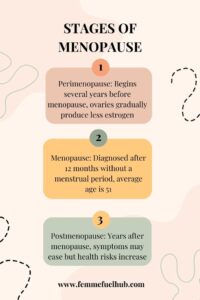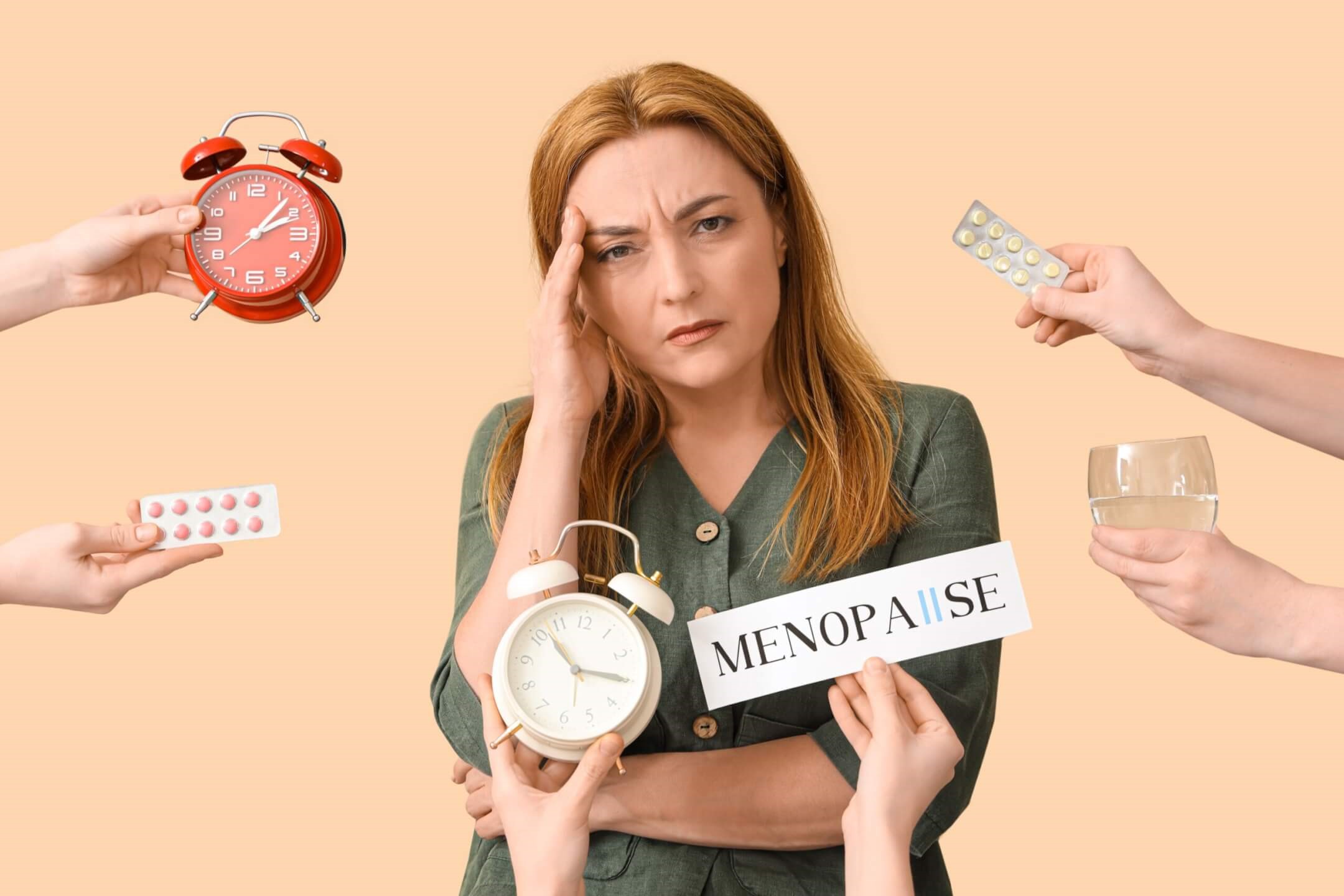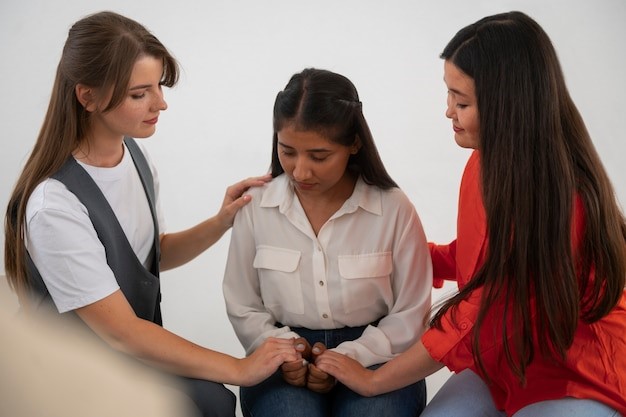Menopause is a natural biological process marking the end of a woman’s reproductive years. It typically occurs between the ages of 45 and 55, with the average age in Australia being 51-52. Menopause can also happen for other reasons, such as: surgery to remove ovaries, and/or womb/uterus; chemotherapy; and radiotherapy to the pelvis. At menopause, oestrogen (the main sex hormone in women) is no longer produced.
This inevitable transition affects women differently and can result in a range of physical, emotional, and psychological symptoms. The onset of menopause can be influenced by various factors, such as race, culture, ethnicity, environment, lifestyle factors (e.g. smoking, alcohol consumption), and hormonal contraception). Understanding the symptoms of menopause, the phases, and how to manage the symptoms can help women navigate this period with awareness and confidence
The Stages of Menopause

Menopause occurs in three main stages:
- Peri-menopause: This phase can begin several years before menopause, typically in a woman’s 40s. The ovaries gradually produce less estrogen, leading to irregular menstrual cycles, hot flashes, and mood changes.
- Menopause: Officially diagnosed after 12 consecutive months without a menstrual period, menopause signifies the end of ovulation and a significant drop in estrogen and progesterone levels.
- Post-menopause: The years following menopause, during which symptoms may ease, but health risks such as osteoporosis and cardiovascular disease increase due to lower hormone levels.
Common Symptoms of Menopause
While menopause is a unique experience for every woman, some symptoms are more common than others. These include:
- Hot Flashes and Night Sweats: Sudden feelings of heat, often accompanied by sweating and a flushed face, can last from a few seconds to several minutes.
- Mood Swings and Irritability: Hormonal fluctuations can impact neurotransmitters, leading to anxiety, depression, or irritability.
- Sleep Disturbances: Insomnia and frequent waking during the night are common due to night sweats and hormonal changes.
- Vaginal Dryness and Sexual Health Changes: Decreased estrogen levels can cause vaginal dryness, discomfort during intercourse, and a lower libido.
- Cognitive Changes: Some women experience “brain fog,” forgetfulness, or difficulty concentrating.
Weight Gain and Metabolism Changes: Many women notice an increase in abdominal fat and a slowed metabolism during menopause.
Managing Menopause Symptoms
Although menopause symptoms can be challenging, there are various ways to manage them:
- Lifestyle Changes: Regular exercise, a balanced diet rich in calcium and vitamin D, and stress-reducing activities like yoga and meditation can improve overall well-being.
- Hormone Therapy (HT): Estrogen or combination therapy can help alleviate hot flashes, vaginal dryness, and osteoporosis risk, but should be used under medical supervision.
- Non-Hormonal Treatments: Some women opt for natural remedies such as black cohosh, soy isoflavones, or cognitive behavioral therapy to manage symptoms.
- Support Networks: Engaging with menopause support groups, talking to healthcare providers, and educating oneself can make the transition smoother.
How to Thrive During Menopause
Instead of dreading menopause, you can take proactive steps to manage the transition to peri-menopause and your symptoms more effectively:
- Talk to Your Doctor – Whether you are considering hormone therapy or natural remedies, professional guidance can help.
- Support Bone Health – Eat calcium-rich foods, take vitamin D supplements, and stay active.
- Improve Sleep Quality – Keep your bedroom cool, avoid screens before bed, and establish a bedtime routine.
- Stay Connected – Talking to friends or joining a support group can make a big difference in your emotional well-being.
Embracing Every Stage of Womanhood
Both menstruation and menopause are part of a woman’s journey—neither defines you, but both shape your experiences. The key to thriving through these changes is listening to your body, treating yourself with kindness, and making small adjustments that support your well-being. By prioritizing self-care and seeking support when needed, you can navigate these transitions with confidence and strength.
 Menopause: A New Chapter, Not the End of the Story
Menopause: A New Chapter, Not the End of the Story
Menopause is a significant life transition, but with the right knowledge and resources, women can navigate it with resilience. By staying informed about the changes occurring in their bodies and seeking appropriate support, women can maintain a high quality of life during and after menopause. By prioritizing self-care, seeking medical advice when needed, and embracing the changes that come with menopause, women can enter this new phase of life with strength and confidence.
Sources
- American College of Obstetricians and Gynecologists (https://www.acog.org).
- Australasian Menopause Society (https://www.menopause.org)
- Cleveland Clinic (https://my.clevelandclinic.org/– Health and diseases after menopause
- Freeman, E. W., Sammel, M. D., Lin, H., & Nelson, D. B. (2020). Associations of hormones and menopausal status with depressed mood in women with no history of depression. Archives of General Psychiatry, 63(4), 375–382.
- Greendale, G. A., Lee, N. P., & Arriola, E. R. (2019). The menopause transition and weight gain: Strategies for prevention. Journal of Women’s Health, 28(1), 34-40.
- Jean Hailes for Women’s Health (https://jeanhailes.org.au).
- The Menopause Society (https://www.menopause.org)
- National Institute on Aging. (2022). Menopause: Time for a change. Retrieved from [https://www.nia.nih.gov]
- North American Menopause Society. (2023). The stages of menopause. Retrieved from [https://www.menopause.org]
- Santoro, N., Epperson, C. N., & Mathews, S. B. (2021). Menopausal symptoms and their management. Endocrinology and Metabolism Clinics of North America, 50(3), 605-621.



